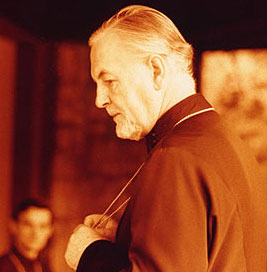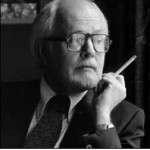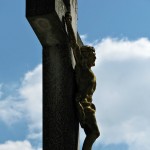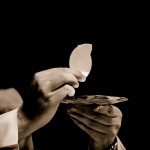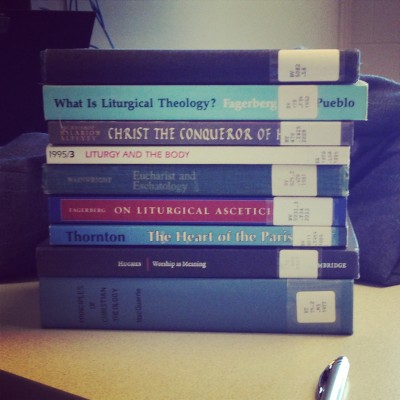My work has been very heavily influenced by Fr. Alexander Schmemann and I think he has a great deal to say on the subjects of liturgy, sacraments, and the church.
For those of you who may not know him: Fr. Schmemann was a priest of Russian descent in the Orthodox Church committed to liturgical theology and renewal. After a teaching period in Paris (1946-1951), he joined the faculty at St. Vladimir’s Seminary in New York where he remained until his death in 1983. Married to Juliana, he was awarded the title of Protopresbyter, the highest accolade available for a married priest in the Orthodox tradition. His writings cover the liturgical life of Orthodox Christianity and call people to a deeper understanding of and participation in the church’s worship and sacraments. I don’t think it is a stretch to claim that Fr. Schmemann is to liturgical studies/theology what N. T. Wright is to New Testament studies.
Conversations and writings about the historicity of liturgy and worship can often lead one down the meandering and false pathway toward seeking a supposedly “unadulterated” or “pure” era of texts and expressions. The same can certainly be said of biblical studies as well. This misguided belief suggests that if only we can follow the breadcrumbs back to the most original text or manuscript then we will know we have obtained something without error, something that we can truly trust. Unfortunately such an errand is a fool’s errand at best. In a section about the modern liturgical renewal movement, Fr. Schmemann had this to say about the historical study of liturgy (liturgiology):
“It became clear that without such theological ‘reflection’ the liturgical revival was threatened either by an excessive submission to the ‘demands of the day,’ to the radical nature of certain ‘missionary’ and ‘pastoral’ movements quite prepared to drop old forms without a second thought or, on the other hand, by a peculiar archeologism which considers the restoration of worship in its ‘primitive purity’ as the panacea for all contemporary ills,” (Introduction to Liturgical Theology, p. 15).
It would appear that an appropriate liturgical renewal/revival would shoot for the middle between throwing the baby out with the bath water in favor of “innovation” and “liturgical entrepreneurship” and seeking for a golden age of liturgy to which we can and should return. Both extremes on the spectrum should be avoided because one does away completely with the Great Tradition of the Church and her worship while the other is so tethered to ancient texts that worshipping community is unable to encounter the Holy One in her midst.
Fr. Schmemann goes on to remark that theological reflection of the liturgy must be ground in its historical study. To expound on the liturgical experience without understanding its historical development and context is to attempt to describe something in a vacuum. I’d like to go a step further and suggest that proper liturgiology will always give birth to liturgical theology. That is, any true study of historical liturgy will always move toward a theological reflection upon the liturgical experience, an understanding of the words and gestures used to describe an encounter with God, and a participation in the Great Tradition of the church.
I have always been fascinated by the modern (read: post-Enlightenment) separation for corporate and private spirituality or prayer. I think that much of this false dichotomy stems from the belief that our faith is somehow separate and private from the public sphere. When Christ is King then all is sacred and nothing is secular. Put another way, there isn’t an inch of this creation over which Christ doesn’t proclaim, “This is mine!” (cf. Abraham Kuyper). Fr. Schmemann was confused as well by this division:
“In the meantime this distinction between ‘corporate’ and ‘private’ worship is a contradiction of the basic and ancient concept of Christian worship as the public act of the Church, in which there is nothing private at all, nor can there be, since this would destroy the very nature of the Church…The purpose of worship is to constitute the Church, precisely to bring what is ‘private’ into the new life, to transform it into what belongs to the Church, i.e. shared with all in Christ,” (p. 23-24).

